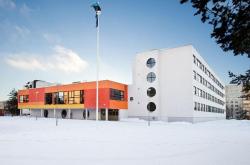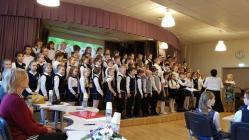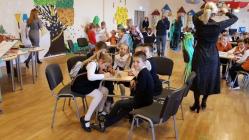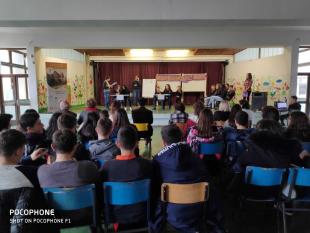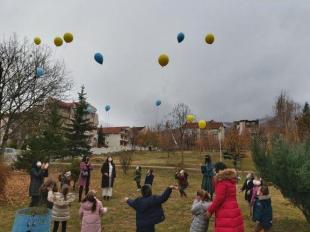THE PARTNERS
BELGIAN SCHOOL
Our establishment is a basic municipal school established in Flénu, suburb of Mons. The school currently has over 350 students aged 2 1/2 to 12 years old. The staff are
composed of 18 full-time teachers and 6 part-time teachers. For 17 years, our establishment has been in linguistic immersion in Dutch. As a result, we
have four female teachers whose language is Dutch. Located in a former mining region for the extraction of coal, it experienced its industrial glory days
from the end of the 18th century until the years 1974 when the last mine stopped its activities. After the Second World War, a great migration took place to work in the
coal mines. Italians, Poles, Turks, Yugoslavs came to work in Belgium. The closure of the coal mines resulted in a great deal of unemployment because the country lived on its
coal industry, but nothing had been thought of for the future of the country. Today, industries have reconverted, new industries have emerged, but unemployment remains
a big problem, especially for people without a high degree. The migrant population has also evolved as, currently, many migrants have moved to
settled in our country w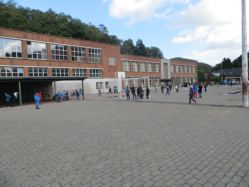 ith, for origin the Maghreb and the Democratic Republic of Congo, a former Belgian colony. Since 1997, we have participated in 9 European projects, first Comenius and now Erasmus +, with great success. Meanwhile, thanks to these projects, we have acquired a great experience of the European world. We have worked with establishments in Portugal, Spain, France, Ireland, England, Italy, Austria, Norway, Latvia, Poland, Hungary, Romania, Greece, Bulgaria, North Macedonia, Cyprus, Turkey, Finland. Eight times we have been coordinator of the projects in which we were involved. The topics were diverse and very interesting for all partners, teachers, students, parents and local authorities. More and more, parents are getting involved in European projects either by welcoming pupils to their homes or by organizing small festivities in relationship with the theme of the project either by transporting students for visits or by participating in a collective meal when welcoming children from other schools. The various experiences have shown us the importance of knowing a second language, the importance of dialogue, the importance of being attentive to others. These projects also have us demonstrated the importance of the digital resources made available for contacts with partners. It is essential now that our students have the ability to use the various means of communication emanating from digital. We have introduced two digital projects in Belgium and they have both been very successful, which will allow our establishment to have new devices essential to the teaching that we wish to carry out.
ith, for origin the Maghreb and the Democratic Republic of Congo, a former Belgian colony. Since 1997, we have participated in 9 European projects, first Comenius and now Erasmus +, with great success. Meanwhile, thanks to these projects, we have acquired a great experience of the European world. We have worked with establishments in Portugal, Spain, France, Ireland, England, Italy, Austria, Norway, Latvia, Poland, Hungary, Romania, Greece, Bulgaria, North Macedonia, Cyprus, Turkey, Finland. Eight times we have been coordinator of the projects in which we were involved. The topics were diverse and very interesting for all partners, teachers, students, parents and local authorities. More and more, parents are getting involved in European projects either by welcoming pupils to their homes or by organizing small festivities in relationship with the theme of the project either by transporting students for visits or by participating in a collective meal when welcoming children from other schools. The various experiences have shown us the importance of knowing a second language, the importance of dialogue, the importance of being attentive to others. These projects also have us demonstrated the importance of the digital resources made available for contacts with partners. It is essential now that our students have the ability to use the various means of communication emanating from digital. We have introduced two digital projects in Belgium and they have both been very successful, which will allow our establishment to have new devices essential to the teaching that we wish to carry out.
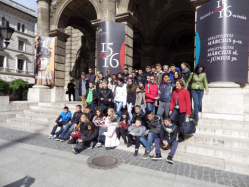
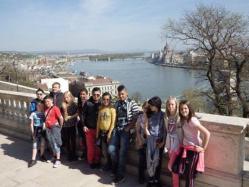
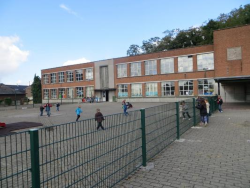
TURKISH SCHOOL
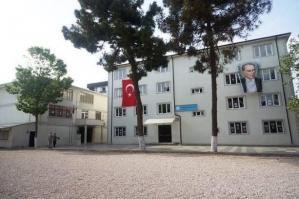 Diyarbak?rl? Ekrem Ergün ?lkokulu is a primary school with 747 students in Biga, a semi-rural town of Çanakkale. Our school has 28 classrooms (including classrooms
Diyarbak?rl? Ekrem Ergün ?lkokulu is a primary school with 747 students in Biga, a semi-rural town of Çanakkale. Our school has 28 classrooms (including classrooms
nursery, primary and special), a library, a music laboratory, play areas and a kitchen in two buildings with a large garden. One director, two directors Assistants and 36 highly qualified teachers work here to increase the success and reputation of our school. Hence, it has been one of the most sought after schools by parents from our province.
The mission of our school is to develop individuals who are confident in themselves, innovative and can adopt the global values, the policy of lifelong learning.
life and support the betterment of mankind. The vision of our schools is to be a national brand of educational activity. In line with our needs and objectives, we have launched projects in our school. We are carrying out 6 active projects in our school which are currently confirmed by the Provincial Directorate of National Education. The goal of all the activities undertaken in our school is to provide a safe and secure environment for all students, including disadvantaged learners (potential dropouts) from our
school. The aim of our educational activities is to equip students with the knowledge and skills necessary to develop the personal qualities necessary for face the challenges of life. To prepare them to be able to build a coexistence with all the communities of our multiethnic country, and to this end, it is necessary to
full cooperation of all stakeholders involved in this process. The school administration and all teachers are open to cooperation and acceptance other positive experiences in order to improve the knowledge capital of our students. The school management and all teachers are open to cooperation and acceptance of other positive experiences in order to improve the process of teaching learning and the well-being of students, teachers and the school itself. The director Recep Topal is the legal representative and ?brahim Dönmez is the contact person of project. Veysel Tekiner is the assistant director and Ay?enur ?limen is the 2nd English teacher in our school. They can easily take over roles if one of them leaves the post. Our school, Diyarbak?rl? Ekrem Ergün ?lkokulu, has already been cooperating with schools for years European partners within the framework of Erasmus + projects and electronic twinning. Our school also carries out national and regional projects which are supported by the Ministry of Education.
The subject of this project is motivating for us since our school has been giving robotics and coding lessons to 3rd and 4th grade students for two years. "Kids Are Coding" is the
name of the project and we have ten certified teachers who are ready to share their experiences with European partners during this project. Due to the Covid-19 situation, it looks like the education system will be more and more integrated with technology.
http://dekremergunilkokulu.meb.k12.tr/
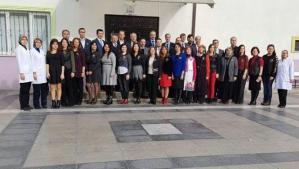
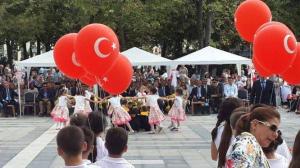
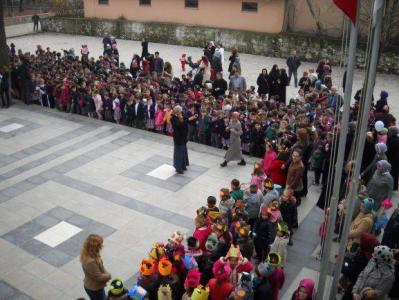
BULGARIAN SCHOOL
Professor Ivan Batakliev Lower Secondary School was established in 1897 by the prominent Bulgarian revivalists Dr. Peter Beron and Aleksandar Ekzarh. It has a rich history and in
his annals are the names of pedagogues with a high civic sense of responsibility and professionalism, guardians of the development of Bulgarian school. Our school is located in the
center of the town of Pazardzhik, enjoys authority and is preferred by students and parents. At present 563 students, aged 7 to 14, study at the school. A director, an assistant director
and 46 highly-qualified and experienced teachers work at the school - teachers who have proven their professionalism and who use a great deal of ambition and creativity in the
process of teaching. Professor Ivan Batakliev Lower Secondary School has Parents ’Board, Student Council and Pubic Council, which support and actively participate in the activities and projects carried out at school. The school has extensive experience in creating and implementing projects, some of which under the European program Erasmus + KA1 and KA2.
In 2017 the school applied and received from the Ministry of Education and Science the opportunity to develop as an innovative school, which has become one of its main priorities.
Our school has a highly qualified and experienced team to work on the implementation and management of this project, as well as the necessary technical equipment - a computer
room with terminal server, a multimedia player at each classroom, a classroom with Asus Transformer Book - hybrid tablets for students and teachers, two interactive whiteboards 75 ',3D Printer and scanner Da Vinci F1, professional MR, robot Robotics - Tagged "MOVE mini & Accessories, suitable for autonomous work, projects for remote control via Bluetooth, micro bit- 5 x 5 LED matrix. Most of the teachers work with electronic student's books and workbooks and electronic data management and storage system In recent years, digitalization has entered all areas of our lives and has become a major focus in the education and upbringing of children. In the current pandemic situation, the skills to,,work in an online environment are extremely important. Innovative classes at our school conduct interdisciplinary lessons that develop skills with a practical focus - information retrieval and document analysis, interactive activities, research work on a pre-set topic, 3D printing and carrying out of project tasks with the participation of robots and robotic toys.
During the distance learning 90% of the students in our school work synchronically in an online environment through various platforms such as shkolo, Google Meet, G Suite and
others. All teachers needed and still need to improve their skills, competencies and digital knowledge. In the current school year 2020 - 2021 our teachers will continue to develop skills for information literacy, cooperation, creativity and problem solving. Working in real and virtual environments will be improved, and cloud technologies will be another means of communication, sharing and creating projects. During this school year, the school has three clubs for extracurricular activities related to robotics and programming. We strongly believe that this project will increase the digital competencies of our teachers and students and will provide an opportunity for sharing experience and good practices.
NORTH MACEDONIAN SCHOOL
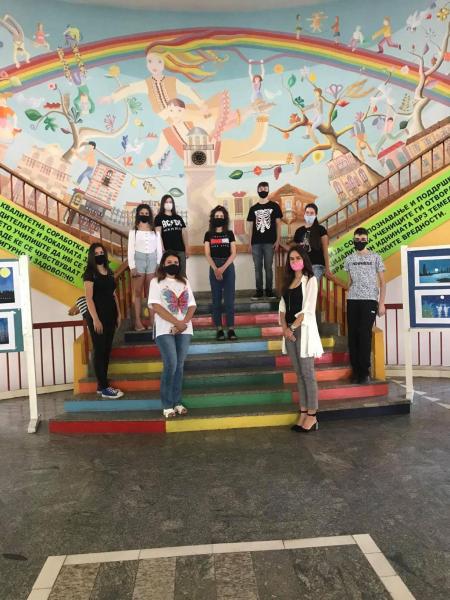 Primary school "St. Kliment Ohridski "is a school which stands for innovation and excellence in teaching. With its 30 years of existence, our school has sealed success
Primary school "St. Kliment Ohridski "is a school which stands for innovation and excellence in teaching. With its 30 years of existence, our school has sealed success
supreme in education, sport, project work and innovation in teaching and learning. Located in the suburbs of the city our school has the largest number of students in the city of 990 and 45 classes from 1 to 9. The successful organization of the educational process and daycare for students of classes I to V are organized by 67 teachers with appropriate professional training. There is also a professional service made up of a pedagogue, a psychologist, a specialist teacher. in special education and a librarian.
In our school, students are educated and educated on the most important values ??to build a healthy person, namely respect for differences, tolerance and the coexistence and acceptance of everyone in the community. Through numerous projects, school activities, exhibitions, performances and celebrations, students are
fully implemented in school life with their teachers and parents.
All this is part of the school's mission "With quality collaboration between teachers, parents and the local community to enable all children in our school to develop in an environment where they feel accepted, loved and sufficiently confident ", as well as the vision" By recognizing and supporting the potential of students, we are opening the way and the door to the future on the foundations of human values. "
In our school, values ??and opportunities continue to be built for every student and teacher, as we share our experiences with each other.
others in order to preserve the integrity of the school. Our school is well known for being an innovative school in the region where we work. We have many projects and teachers and students participate in them all the time.
This leads to professional development and an improvement in the teaching process. We also have many experiences in ICT projects.
We were a pilot school in the Primery School project covered by USAID and we have robots that are used in teaching and school activities. Our school has also was enthusiastic about the government project which obtained tablets for the students. It was only for a class, but now we have a room special for students in grades 1-5 and they use them to learn and teach ICT subjects. Also last year, our school was part of the funded project
by Metamorphosis, it was all about coding and programming for 9-11 year olds. Students have the chance to learn what programming is and understand everyday situations with programming. They made little robots and gave them the command to make simple movements. The teachers involved in the project are technicians who have a lot of knowledge and experience with ICT technologies as well as working on international projects.
http://ousvklimentohridskibt.weebly.com/
Facebook page: https://www.facebook.com/profile.php?id=100024975642231
video from the school: https://www.youtube.com/watch?v=SZni5mVqJyg
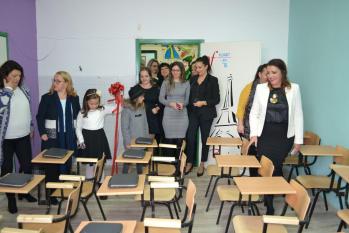
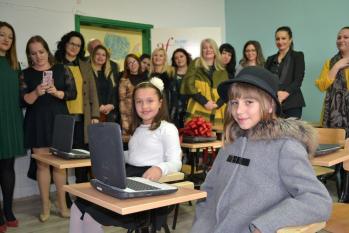
CROATIAN SCHOOL
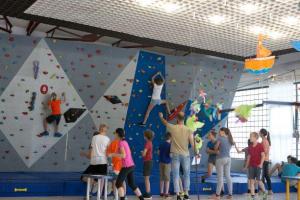 Matija Gubec Primary School has been a leading Croatian school in various fields over the past decades. We are located in the capital of Croatia,
Matija Gubec Primary School has been a leading Croatian school in various fields over the past decades. We are located in the capital of Croatia,
Zagreb, Knežija district. The school was founded in 1940. In 1993 and 2009, additional rooms were added. Our school is very functional,
furnished in a modern style and equipped with new technological devices. The oldest part of the school has eleven classrooms used for teaching
pupils from the first to the fourth year of primary school. The most recent part of the school building has six rooms dedicated to specialized purposes, rooms for the
staff, a library, a computer lab, rooms for crafts, religious education (Catholic and Muslim), the director's office, staff administration, conference rooms and additional classrooms. All classrooms are equipped with computers, multimedia projectors or even smartphones. Apart from that, the computer lab is equipped with two big screen 4K HDR TVs. High technology in workspaces combined with a modern furniture and good lighting allow us to achieve a creative level of work done, including a high level of media culture. In our school premises, we also have a room dedicated to cooking classes and two separate sports halls, while our schoolyard has volleyball, basketball and tennis court, a football and handball field, an athletics track and a garden area. We have just completed an ESF project as well as an Erasmus + KA1 project before, and we are currently in the final stages of our Erasmus + KA2 project.
The school has 679 students, 74 teachers, 1 director, 5 specialists in pedagogy and psychology and 24 other employees. It has 24 groups of students divided into 8 levels
in the national curriculum and 8 additional groups which have all their classes in English.
All English language student programs have been running at our school since 1995. The program is held by instructions from the National Ministry of Education,
and all classes are specially modified for this program. In 2002, we started with the internationally recognized IB program, for which we were authorized in 2005.
In 1996, we won the city of Zagreb award for outstanding youth work. Through our national and international programs, we try to encourage the sharing of different cultures, group work and the development of tolerance. This project is a perfect extension of two areas in which our school has been very active over the past three years.
The first concerns European Union projects. We are in the final stages of our first KA2 project, which was a great development for us after our project KA1.
In the KA1 project, we aimed to improve the skills of teachers, while the KA2 project focused on improving the skills of our students in mastery
of the English language, which could naturally be extended by this project.
The second activity that our school has held in high regard in recent years is the involvement of our students in robotics and STEM in general.
We have participated in many robotics competitions and won several medals at the World Robotics Olympiad (WRO).
Our biggest achievement came in 2019 when our robotics team qualified for the global finals of the world's largest robotics competition -
First Lego League (FLL).
Ten of our students as well as teachers participated in the final competition held in Byblos, Lebanon.
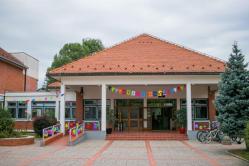
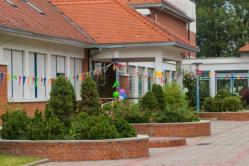
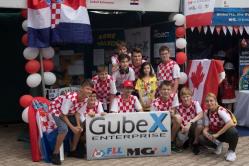
SLOVENIAN SCHOOL
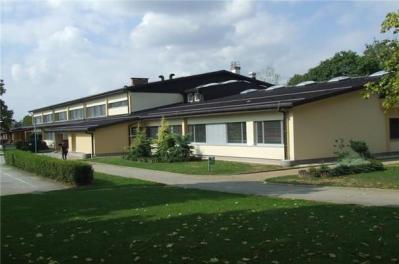 We are a small school in the countryside in the North-East part of Slovenia, not far away from Croatian, Austrian and Hungarian border. There is one class in each generation of our
We are a small school in the countryside in the North-East part of Slovenia, not far away from Croatian, Austrian and Hungarian border. There is one class in each generation of our
students with the total of 163 students and 23 members of staff. We are active in the local environment and taking part in the national and international projects. We are especially ,interested in using ICT to upgrade lessons and productivity.
We are highly active in the field of using information-communication technology in the classroom as well as during the home schooling. We have been involved in the national project innovative pedagogy, dealing with different applications and online learning toolsin different school subjects.
Our students and teachers are familiar with word / excel / powerpoint documents, using school webpager and online classrooms, they can also upload their own material in the online classroom. They can also use different online learning tools for educational purposes, programming such as scratch, making films and video, some students can create their own websites. They communicate using e-mails and can join a webconference. There is also an extra-curricular activity Roboticd available for students and there is a small group of
studentsd involved in this activity.
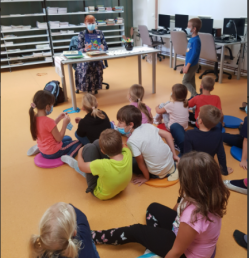
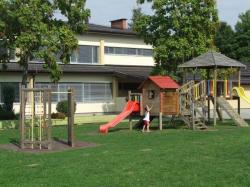
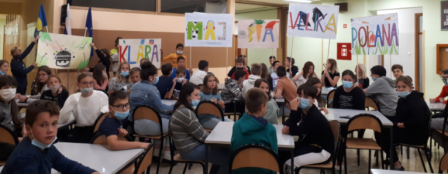
SPANISH SCHOOL
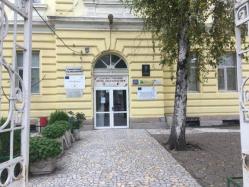 We are a public primary school located on the east coast of Spain in a town called Ontinyent with a population of 35,000. We are however
We are a public primary school located on the east coast of Spain in a town called Ontinyent with a population of 35,000. We are however
very close to the beach, in a mountain climate. The school is placed in an average economic level of a neighborhood. Most parents work in textile factories.
We have students from 2 to 12 years old. Today, we have 305 students in nursery and primary. We have 30 teachers and we work in three different languages:
Valencian, Spanish and English integrally through the teaching and learning process. We carry out a large number of projects over the years by which we improve teaching methodologies in order to prepare our students for the globalized society in which we live. In addition, we are a school inclusive where students with special needs work with their classmates in an integral way assisted by the psychologist, speech therapist and specialist teacher.
We have immigrant students at school.
This project will be developed by the Erasmus Commission formed by six teachers from the school, all of B2 level, led by Guillermo Conejero Galiana with extensive experience
in the Erasmus world. If he leaves, the commission will choose another responsible person to coordinate it. At CEIP Bonavista we have a lot of resources and services to develop our usual work such as a good Internet and WIFI connection, computers, projectors and interactive whiteboards in all classrooms. We have a lot of special classrooms like theater, lab, computer room with 20 computers, a music room, a gym, a library ... We try to develop a good number of projects to increase motivation and
the adaptation of students to the demands of society. Our main objective is to achieve meaningful learning for students and to develop in them a competence
communicative. We are a non-calm staff who try to improve day by day to offer the best of ourselves, and this is the main reason to continue this
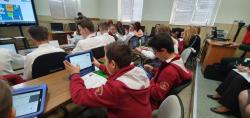 project, that it will allow us to internationalize our school by pursuing a European project. We are also developing two KA 101s and a few winning projects. In this
project, that it will allow us to internationalize our school by pursuing a European project. We are also developing two KA 101s and a few winning projects. In this
case, we are very positive in learning the objectives proposed during this KA226 on the basis of the numerical aspects. In addition, for 5th and 6th year students, it is the 7th
year in which the use of tablets was replaced by the use of textbooks in school, so this project is consolidated in our school, so that we can share it with our partners. Anyway, there are other aspects related to the digital world that we need to improve just to develop properly in the world. digital securely.
We can see how students' motivation increases when they feel better throughout the learning process, so the digital aspects can
be a powerful tool. In addition, we are very happy to share our cultural aspects at the same time as we can learn new characteristics from others.
country. At the same time, involving the students throughout this project will help our children develop cultural awareness.
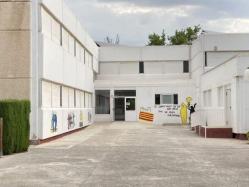
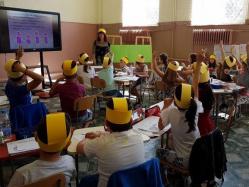
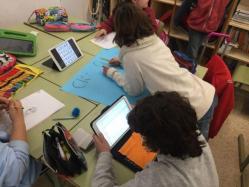
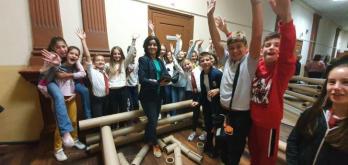
ESTONIAN SCHOOL
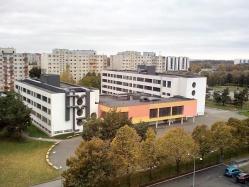 Lasnamäe Vene Gümnaasium is a big school (there are around 1200 students in it and 85 teachers) that has got its own traditions and customs. It is a high school that includes basic level, too. The main aim of the school is to give students qualitative education based on modern skills and needs. Besides teachers, there are 11 specialists such as social workers who help both teachers and students as well as parents in teaching / learning process.
Lasnamäe Vene Gümnaasium is a big school (there are around 1200 students in it and 85 teachers) that has got its own traditions and customs. It is a high school that includes basic level, too. The main aim of the school is to give students qualitative education based on modern skills and needs. Besides teachers, there are 11 specialists such as social workers who help both teachers and students as well as parents in teaching / learning process.
Children and teachers actively participate in different local projects and events, but there is no experience in international projects that is why we would like to join this project.
Since there is no experience of participating in international projects, we are ready to join and learn each skill that is needed. The project is connected with robotics and we have classes and experienced teacher who teaches students how to make robots and how they work. We also have got different gadgets such as 3D printer, Interactive board that can be also used during the project. As the main contact person I have already participated in Erasmus + projects before (when I worked in another school) and know how it works, so I can help other teachers in need.
